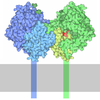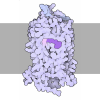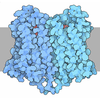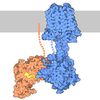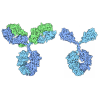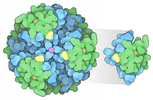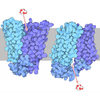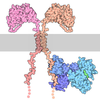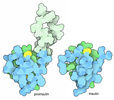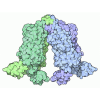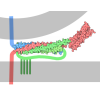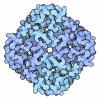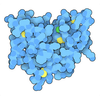+ Open data
Open data
- Basic information
Basic information
| Entry |  | |||||||||
|---|---|---|---|---|---|---|---|---|---|---|
| Title | Cryo-EM structure of the Apo CCR1-Gi complex | |||||||||
 Map data Map data | Apo form of CCR1-Gi complex | |||||||||
 Sample Sample |
| |||||||||
| Function / homology |  Function and homology information Function and homology informationchemokine (C-C motif) ligand 7 binding / chemokine (C-C motif) ligand 5 binding /  chemokine receptor activity / C-C chemokine receptor activity / negative regulation of bone mineralization / C-C chemokine binding / phosphatidylinositol phospholipase C activity / positive regulation of calcium ion transport / positive regulation of osteoclast differentiation / chemokine-mediated signaling pathway ...chemokine (C-C motif) ligand 7 binding / chemokine (C-C motif) ligand 5 binding / chemokine receptor activity / C-C chemokine receptor activity / negative regulation of bone mineralization / C-C chemokine binding / phosphatidylinositol phospholipase C activity / positive regulation of calcium ion transport / positive regulation of osteoclast differentiation / chemokine-mediated signaling pathway ...chemokine (C-C motif) ligand 7 binding / chemokine (C-C motif) ligand 5 binding /  chemokine receptor activity / C-C chemokine receptor activity / negative regulation of bone mineralization / C-C chemokine binding / phosphatidylinositol phospholipase C activity / positive regulation of calcium ion transport / positive regulation of osteoclast differentiation / chemokine-mediated signaling pathway / positive regulation of monocyte chemotaxis / Chemokine receptors bind chemokines / dendritic cell chemotaxis / chemokine receptor activity / C-C chemokine receptor activity / negative regulation of bone mineralization / C-C chemokine binding / phosphatidylinositol phospholipase C activity / positive regulation of calcium ion transport / positive regulation of osteoclast differentiation / chemokine-mediated signaling pathway / positive regulation of monocyte chemotaxis / Chemokine receptors bind chemokines / dendritic cell chemotaxis /  exocytosis / Interleukin-10 signaling / G protein-coupled receptor signaling pathway, coupled to cyclic nucleotide second messenger / Adenylate cyclase inhibitory pathway / positive regulation of protein localization to cell cortex / regulation of cAMP-mediated signaling / D2 dopamine receptor binding / G protein-coupled serotonin receptor binding / regulation of mitotic spindle organization / cellular response to forskolin / adenylate cyclase-inhibiting G protein-coupled receptor signaling pathway / cell chemotaxis / Regulation of insulin secretion / G protein-coupled receptor binding / calcium-mediated signaling / Olfactory Signaling Pathway / G-protein beta/gamma-subunit complex binding / Activation of the phototransduction cascade / G beta:gamma signalling through PLC beta / Presynaptic function of Kainate receptors / Thromboxane signalling through TP receptor / adenylate cyclase-modulating G protein-coupled receptor signaling pathway / G-protein activation / G protein-coupled acetylcholine receptor signaling pathway / Activation of G protein gated Potassium channels / Inhibition of voltage gated Ca2+ channels via Gbeta/gamma subunits / Prostacyclin signalling through prostacyclin receptor / Glucagon signaling in metabolic regulation / G beta:gamma signalling through CDC42 / ADP signalling through P2Y purinoceptor 12 / G beta:gamma signalling through BTK / Synthesis, secretion, and inactivation of Glucagon-like Peptide-1 (GLP-1) / Sensory perception of sweet, bitter, and umami (glutamate) taste / response to peptide hormone / photoreceptor disc membrane / intracellular calcium ion homeostasis / Adrenaline,noradrenaline inhibits insulin secretion / Glucagon-type ligand receptors / Vasopressin regulates renal water homeostasis via Aquaporins / G alpha (z) signalling events / response to wounding / cellular response to catecholamine stimulus / Glucagon-like Peptide-1 (GLP1) regulates insulin secretion / ADORA2B mediated anti-inflammatory cytokines production / cytokine-mediated signaling pathway / ADP signalling through P2Y purinoceptor 1 / adenylate cyclase-activating dopamine receptor signaling pathway / G beta:gamma signalling through PI3Kgamma / cellular response to prostaglandin E stimulus / Cooperation of PDCL (PhLP1) and TRiC/CCT in G-protein beta folding / sensory perception of taste / GPER1 signaling / GDP binding / G-protein beta-subunit binding / Inactivation, recovery and regulation of the phototransduction cascade / exocytosis / Interleukin-10 signaling / G protein-coupled receptor signaling pathway, coupled to cyclic nucleotide second messenger / Adenylate cyclase inhibitory pathway / positive regulation of protein localization to cell cortex / regulation of cAMP-mediated signaling / D2 dopamine receptor binding / G protein-coupled serotonin receptor binding / regulation of mitotic spindle organization / cellular response to forskolin / adenylate cyclase-inhibiting G protein-coupled receptor signaling pathway / cell chemotaxis / Regulation of insulin secretion / G protein-coupled receptor binding / calcium-mediated signaling / Olfactory Signaling Pathway / G-protein beta/gamma-subunit complex binding / Activation of the phototransduction cascade / G beta:gamma signalling through PLC beta / Presynaptic function of Kainate receptors / Thromboxane signalling through TP receptor / adenylate cyclase-modulating G protein-coupled receptor signaling pathway / G-protein activation / G protein-coupled acetylcholine receptor signaling pathway / Activation of G protein gated Potassium channels / Inhibition of voltage gated Ca2+ channels via Gbeta/gamma subunits / Prostacyclin signalling through prostacyclin receptor / Glucagon signaling in metabolic regulation / G beta:gamma signalling through CDC42 / ADP signalling through P2Y purinoceptor 12 / G beta:gamma signalling through BTK / Synthesis, secretion, and inactivation of Glucagon-like Peptide-1 (GLP-1) / Sensory perception of sweet, bitter, and umami (glutamate) taste / response to peptide hormone / photoreceptor disc membrane / intracellular calcium ion homeostasis / Adrenaline,noradrenaline inhibits insulin secretion / Glucagon-type ligand receptors / Vasopressin regulates renal water homeostasis via Aquaporins / G alpha (z) signalling events / response to wounding / cellular response to catecholamine stimulus / Glucagon-like Peptide-1 (GLP1) regulates insulin secretion / ADORA2B mediated anti-inflammatory cytokines production / cytokine-mediated signaling pathway / ADP signalling through P2Y purinoceptor 1 / adenylate cyclase-activating dopamine receptor signaling pathway / G beta:gamma signalling through PI3Kgamma / cellular response to prostaglandin E stimulus / Cooperation of PDCL (PhLP1) and TRiC/CCT in G-protein beta folding / sensory perception of taste / GPER1 signaling / GDP binding / G-protein beta-subunit binding / Inactivation, recovery and regulation of the phototransduction cascade /  heterotrimeric G-protein complex / heterotrimeric G-protein complex /  chemotaxis / calcium ion transport / G alpha (12/13) signalling events / chemotaxis / calcium ion transport / G alpha (12/13) signalling events /  extracellular vesicle / signaling receptor complex adaptor activity / Thrombin signalling through proteinase activated receptors (PARs) / cell-cell signaling / retina development in camera-type eye / extracellular vesicle / signaling receptor complex adaptor activity / Thrombin signalling through proteinase activated receptors (PARs) / cell-cell signaling / retina development in camera-type eye /  GTPase binding / Ca2+ pathway / phospholipase C-activating G protein-coupled receptor signaling pathway / GTPase binding / Ca2+ pathway / phospholipase C-activating G protein-coupled receptor signaling pathway /  cell cortex / midbody / positive regulation of cytosolic calcium ion concentration / G alpha (i) signalling events / fibroblast proliferation / G alpha (s) signalling events / G alpha (q) signalling events / Ras protein signal transduction / cell population proliferation / Extra-nuclear estrogen signaling / cell surface receptor signaling pathway / positive regulation of ERK1 and ERK2 cascade / cell cortex / midbody / positive regulation of cytosolic calcium ion concentration / G alpha (i) signalling events / fibroblast proliferation / G alpha (s) signalling events / G alpha (q) signalling events / Ras protein signal transduction / cell population proliferation / Extra-nuclear estrogen signaling / cell surface receptor signaling pathway / positive regulation of ERK1 and ERK2 cascade /  cell adhesion / positive regulation of cell migration / cell adhesion / positive regulation of cell migration /  immune response / immune response /  inflammatory response / inflammatory response /  cell cycle / G protein-coupled receptor signaling pathway / lysosomal membrane / cell cycle / G protein-coupled receptor signaling pathway / lysosomal membrane /  cell division cell divisionSimilarity search - Function | |||||||||
| Biological species |   Homo sapiens (human) Homo sapiens (human) | |||||||||
| Method |  single particle reconstruction / single particle reconstruction /  cryo EM / Resolution: 2.9 Å cryo EM / Resolution: 2.9 Å | |||||||||
 Authors Authors | Shao Z / Shen Q / Mao C / Yao B / Chen L / Zhang H / Shen D / Zhang C / Li W / Du X ...Shao Z / Shen Q / Mao C / Yao B / Chen L / Zhang H / Shen D / Zhang C / Li W / Du X / Li F / Ma H / Chen Z / Xu HE / Ying S / Zhang Y / Shen H | |||||||||
| Funding support |  China, 1 items China, 1 items
| |||||||||
 Citation Citation |  Journal: Nat Chem Biol / Year: 2022 Journal: Nat Chem Biol / Year: 2022Title: Identification and mechanism of G protein-biased ligands for chemokine receptor CCR1. Authors: Zhehua Shao / Qingya Shen / Bingpeng Yao / Chunyou Mao / Li-Nan Chen / Huibing Zhang / Dan-Dan Shen / Chao Zhang / Weijie Li / Xufei Du / Fei Li / Honglei Ma / Zhi-Hua Chen / H Eric Xu / ...Authors: Zhehua Shao / Qingya Shen / Bingpeng Yao / Chunyou Mao / Li-Nan Chen / Huibing Zhang / Dan-Dan Shen / Chao Zhang / Weijie Li / Xufei Du / Fei Li / Honglei Ma / Zhi-Hua Chen / H Eric Xu / Songmin Ying / Yan Zhang / Huahao Shen /  Abstract: Biased signaling of G protein-coupled receptors describes an ability of different ligands that preferentially activate an alternative downstream signaling pathway. In this work, we identified and ...Biased signaling of G protein-coupled receptors describes an ability of different ligands that preferentially activate an alternative downstream signaling pathway. In this work, we identified and characterized different N-terminal truncations of endogenous chemokine CCL15 as balanced or biased agonists targeting CCR1, and presented three cryogenic-electron microscopy structures of the CCR1-G complex in the ligand-free form or bound to different CCL15 truncations with a resolution of 2.6-2.9 Å, illustrating the structural basis of natural biased signaling that initiates an inflammation response. Complemented with pharmacological and computational studies, these structures revealed it was the conformational change of Tyr291 (Y291) in CCR1 that triggered its polar network rearrangement in the orthosteric binding pocket and allosterically regulated the activation of β-arrestin signaling. Our structure of CCL15-bound CCR1 also exhibited a critical site for ligand binding distinct from many other chemokine-receptor complexes, providing new insights into the mode of chemokine recognition. | |||||||||
| History |
|
- Structure visualization
Structure visualization
| Supplemental images |
|---|
- Downloads & links
Downloads & links
-EMDB archive
| Map data |  emd_32020.map.gz emd_32020.map.gz | 36 MB |  EMDB map data format EMDB map data format | |
|---|---|---|---|---|
| Header (meta data) |  emd-32020-v30.xml emd-32020-v30.xml emd-32020.xml emd-32020.xml | 16.5 KB 16.5 KB | Display Display |  EMDB header EMDB header |
| Images |  emd_32020.png emd_32020.png | 88.6 KB | ||
| Archive directory |  http://ftp.pdbj.org/pub/emdb/structures/EMD-32020 http://ftp.pdbj.org/pub/emdb/structures/EMD-32020 ftp://ftp.pdbj.org/pub/emdb/structures/EMD-32020 ftp://ftp.pdbj.org/pub/emdb/structures/EMD-32020 | HTTPS FTP |
-Related structure data
| Related structure data |  7vl8MC  7vl9C  7vlaC M: atomic model generated by this map C: citing same article ( |
|---|---|
| Similar structure data | Similarity search - Function & homology  F&H Search F&H Search |
- Links
Links
| EMDB pages |  EMDB (EBI/PDBe) / EMDB (EBI/PDBe) /  EMDataResource EMDataResource |
|---|---|
| Related items in Molecule of the Month |
- Map
Map
| File |  Download / File: emd_32020.map.gz / Format: CCP4 / Size: 42.9 MB / Type: IMAGE STORED AS FLOATING POINT NUMBER (4 BYTES) Download / File: emd_32020.map.gz / Format: CCP4 / Size: 42.9 MB / Type: IMAGE STORED AS FLOATING POINT NUMBER (4 BYTES) | ||||||||||||||||||||
|---|---|---|---|---|---|---|---|---|---|---|---|---|---|---|---|---|---|---|---|---|---|
| Annotation | Apo form of CCR1-Gi complex | ||||||||||||||||||||
| Voxel size | X=Y=Z: 1.014 Å | ||||||||||||||||||||
| Density |
| ||||||||||||||||||||
| Symmetry | Space group: 1 | ||||||||||||||||||||
| Details | EMDB XML:
|
-Supplemental data
- Sample components
Sample components
-Entire : Apo form CCR1-Gi complex
| Entire | Name: Apo form CCR1-Gi complex |
|---|---|
| Components |
|
-Supramolecule #1: Apo form CCR1-Gi complex
| Supramolecule | Name: Apo form CCR1-Gi complex / type: complex / ID: 1 / Parent: 0 / Macromolecule list: #1-#5 |
|---|---|
| Source (natural) | Organism:   Homo sapiens (human) Homo sapiens (human) |
| Recombinant expression | Organism:   Spodoptera frugiperda (fall armyworm) Spodoptera frugiperda (fall armyworm) |
-Macromolecule #1: Guanine nucleotide-binding protein G(i) subunit alpha-1
| Macromolecule | Name: Guanine nucleotide-binding protein G(i) subunit alpha-1 type: protein_or_peptide / ID: 1 / Number of copies: 1 / Enantiomer: LEVO |
|---|---|
| Source (natural) | Organism:   Homo sapiens (human) Homo sapiens (human) |
| Molecular weight | Theoretical: 40.414047 KDa |
| Recombinant expression | Organism:   Spodoptera frugiperda (fall armyworm) Spodoptera frugiperda (fall armyworm) |
| Sequence | String: MGCTLSAEDK AAVERSKMID RNLREDGEKA AREVKLLLLG AGESGKNTIV KQMKIIHEAG YSEEECKQYK AVVYSNTIQS IIAIIRAMG RLKIDFGDSA RADDARQLFV LAGAAEEGFM TAELAGVIKR LWKDSGVQAC FNRSREYQLN DSAAYYLNDL D RIAQPNYI ...String: MGCTLSAEDK AAVERSKMID RNLREDGEKA AREVKLLLLG AGESGKNTIV KQMKIIHEAG YSEEECKQYK AVVYSNTIQS IIAIIRAMG RLKIDFGDSA RADDARQLFV LAGAAEEGFM TAELAGVIKR LWKDSGVQAC FNRSREYQLN DSAAYYLNDL D RIAQPNYI PTQQDVLRTR VKTTGIVETH FTFKDLHFKM FDVGAQRSER KKWIHCFEGV TAIIFCVALS DYDLVLAEDE EM NRMHASM KLFDSICNNK WFTDTSIILF LNKKDLFEEK IKKSPLTICY PEYAGSNTYE EAAAYIQCQF EDLNKRKDTK EIY THFTCS TDTKNVQFVF DAVTDVIIKN NLKDCGLF |
-Macromolecule #2: Guanine nucleotide-binding protein G(I)/G(S)/G(T) subunit beta-1
| Macromolecule | Name: Guanine nucleotide-binding protein G(I)/G(S)/G(T) subunit beta-1 type: protein_or_peptide / ID: 2 / Number of copies: 1 / Enantiomer: LEVO |
|---|---|
| Source (natural) | Organism:   Homo sapiens (human) Homo sapiens (human) |
| Molecular weight | Theoretical: 37.728152 KDa |
| Recombinant expression | Organism:   Spodoptera frugiperda (fall armyworm) Spodoptera frugiperda (fall armyworm) |
| Sequence | String: GPGSSGSELD QLRQEAEQLK NQIRDARKAC ADATLSQITN NIDPVGRIQM RTRRTLRGHL AKIYAMHWGT DSRLLVSASQ DGKLIIWDS YTTNKVHAIP LRSSWVMTCA YAPSGNYVAC GGLDNICSIY NLKTREGNVR VSRELAGHTG YLSCCRFLDD N QIVTSSGD ...String: GPGSSGSELD QLRQEAEQLK NQIRDARKAC ADATLSQITN NIDPVGRIQM RTRRTLRGHL AKIYAMHWGT DSRLLVSASQ DGKLIIWDS YTTNKVHAIP LRSSWVMTCA YAPSGNYVAC GGLDNICSIY NLKTREGNVR VSRELAGHTG YLSCCRFLDD N QIVTSSGD TTCALWDIET GQQTTTFTGH TGDVMSLSLA PDTRLFVSGA CDASAKLWDV REGMCRQTFT GHESDINAIC FF PNGNAFA TGSDDATCRL FDLRADQELM TYSHDNIICG ITSVSFSKSG RLLLAGYDDF NCNVWDALKA DRAGVLAGHD NRV SCLGVT DDGMAVATGS WDSFLKIWN |
-Macromolecule #3: Guanine nucleotide-binding protein G(I)/G(S)/G(O) subunit gamma-2
| Macromolecule | Name: Guanine nucleotide-binding protein G(I)/G(S)/G(O) subunit gamma-2 type: protein_or_peptide / ID: 3 / Number of copies: 1 / Enantiomer: LEVO |
|---|---|
| Source (natural) | Organism:   Homo sapiens (human) Homo sapiens (human) |
| Molecular weight | Theoretical: 7.861143 KDa |
| Recombinant expression | Organism:   Spodoptera frugiperda (fall armyworm) Spodoptera frugiperda (fall armyworm) |
| Sequence | String: MASNNTASIA QARKLVEQLK MEANIDRIKV SKAAADLMAY CEAHAKEDPL LTPVPASENP FREKKFFCAI L |
-Macromolecule #4: C-C chemokine receptor type 1
| Macromolecule | Name: C-C chemokine receptor type 1 / type: protein_or_peptide / ID: 4 / Number of copies: 1 / Enantiomer: LEVO |
|---|---|
| Source (natural) | Organism:   Homo sapiens (human) Homo sapiens (human) |
| Molecular weight | Theoretical: 42.203547 KDa |
| Recombinant expression | Organism:   Spodoptera frugiperda (fall armyworm) Spodoptera frugiperda (fall armyworm) |
| Sequence | String: GGSGMETPNT TEDYDTTTEF DYGDATPCQK VNERAFGAQL LPPLYSLVFV IGLVGNILVV LVLVQYKRLK NMTSIYLLNL AISDLLFLF TLPFWIDYKL KDDWVFGDAM CKILSGFYYT GLYSEIFFII LLTIDRYLAI VHAVFALRAR TVTFGVITSI I IWALAILA ...String: GGSGMETPNT TEDYDTTTEF DYGDATPCQK VNERAFGAQL LPPLYSLVFV IGLVGNILVV LVLVQYKRLK NMTSIYLLNL AISDLLFLF TLPFWIDYKL KDDWVFGDAM CKILSGFYYT GLYSEIFFII LLTIDRYLAI VHAVFALRAR TVTFGVITSI I IWALAILA SMPGLYFSKT QWEFTHHTCS LHFPHESLRE WKLFQALKLN LFGLVLPLLV MIICYTGIIK ILLRRPNEKK SK AVRLIFV IMIIFFLFWT PYNLTILISV FQDFLFTHEC EQSRHLDLAV QVTEVIAYTH CCVNPVIYAF VGERFRKYLR QLF HRRVAV HLVKWLPFLS VDRLERVSST SPSTGEHELS AGFLEVLFQ |
-Macromolecule #5: scFv16
| Macromolecule | Name: scFv16 / type: protein_or_peptide / ID: 5 / Number of copies: 1 / Enantiomer: LEVO |
|---|---|
| Source (natural) | Organism:   Homo sapiens (human) Homo sapiens (human) |
| Molecular weight | Theoretical: 27.340482 KDa |
| Recombinant expression | Organism:   Spodoptera frugiperda (fall armyworm) Spodoptera frugiperda (fall armyworm) |
| Sequence | String: DVQLVESGGG LVQPGGSRKL SCSASGFAFS SFGMHWVRQA PEKGLEWVAY ISSGSGTIYY ADTVKGRFTI SRDDPKNTLF LQMTSLRSE DTAMYYCVRS IYYYGSSPFD FWGQGTTLTV SSGGGGSGGG GSGGGGSDIV MTQATSSVPV TPGESVSISC R SSKSLLHS ...String: DVQLVESGGG LVQPGGSRKL SCSASGFAFS SFGMHWVRQA PEKGLEWVAY ISSGSGTIYY ADTVKGRFTI SRDDPKNTLF LQMTSLRSE DTAMYYCVRS IYYYGSSPFD FWGQGTTLTV SSGGGGSGGG GSGGGGSDIV MTQATSSVPV TPGESVSISC R SSKSLLHS NGNTYLYWFL QRPGQSPQLL IYRMSNLASG VPDRFSGSGS GTAFTLTISR LEAEDVGVYY CMQHLEYPLT FG AGTKLEL KGSLEVLFQ |
-Macromolecule #6: CHOLESTEROL
| Macromolecule | Name: CHOLESTEROL / type: ligand / ID: 6 / Number of copies: 1 / Formula: CLR |
|---|---|
| Molecular weight | Theoretical: 386.654 Da |
| Chemical component information | 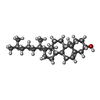 ChemComp-CLR: |
-Experimental details
-Structure determination
| Method |  cryo EM cryo EM |
|---|---|
 Processing Processing |  single particle reconstruction single particle reconstruction |
| Aggregation state | particle |
- Sample preparation
Sample preparation
| Buffer | pH: 7.5 |
|---|---|
| Vitrification | Cryogen name: ETHANE / Instrument: FEI VITROBOT MARK IV |
- Electron microscopy
Electron microscopy
| Microscope | FEI TITAN KRIOS |
|---|---|
| Electron beam | Acceleration voltage: 300 kV / Electron source:  FIELD EMISSION GUN FIELD EMISSION GUN |
| Electron optics | Illumination mode: FLOOD BEAM / Imaging mode: BRIGHT FIELD Bright-field microscopy Bright-field microscopy |
| Image recording | Film or detector model: GATAN K2 SUMMIT (4k x 4k) / Detector mode: COUNTING / Average electron dose: 62.0 e/Å2 |
| Experimental equipment |  Model: Titan Krios / Image courtesy: FEI Company |
- Image processing
Image processing
| CTF correction | Software - Name: Gctf (ver. v1.18) |
|---|---|
| Initial angle assignment | Type: RANDOM ASSIGNMENT |
| Final angle assignment | Type: MAXIMUM LIKELIHOOD |
| Final reconstruction | Resolution.type: BY AUTHOR / Resolution: 2.9 Å / Resolution method: FSC 0.143 CUT-OFF / Number images used: 391181 |
 Movie
Movie Controller
Controller







